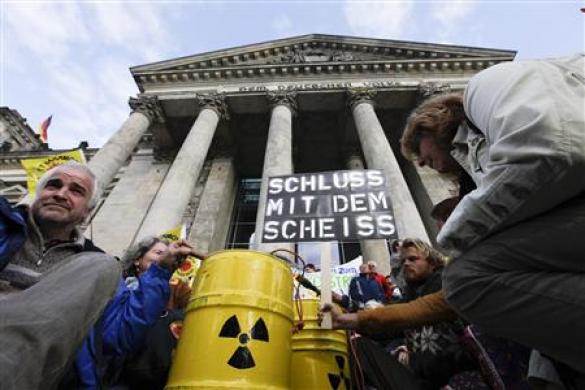Thousands Surround Merkel Office In Nuclear Protest
Date: 20-Sep-10
Country: GERMANY
Author: Dave Graham

Anti-nuclear protesters demonstrate at the Reichstag building
during a demonstration against German government's energy policy at
the governmental district in Berlin, September 18, 2010. The
Reichstag is the seat of the German lower house of parliament
Photo: Thomas Peter
Tens of thousands of Germans surrounded Chancellor Angela Merkel's office Saturday in an anti-nuclear demonstration that organizers said was the biggest of its kind since the Chernobyl disaster in 1986.
The protest, which organizers said drew 100,000 people, could help to mobilize growing grass-roots opposition to Merkel's ruling center-right coalition, which has suffered a slump in popularity since taking office last October.
Near the start of the protest, police said there were close to 40,000 demonstrators. They declined to give a later estimate.
In a peaceful march around Berlin's government quarter, protesters converged on Merkel's chancellery to call for a stop to her unpopular plans to extend the lifespans of Germany's nuclear power stations by an average of 12 years.
Waving banners with slogans like "shut down the government now," demonstrators trudged through rain to urge Merkel to backtrack and uphold a pledge made by her predecessor Gerhard Schroeder to switch off Germany's nuclear power plants by 2021.
"There's not been such a big (anti-nuclear) demonstration in one place since 1986," said Jochen Stay, one of the protest's main organizers. "We've made it very clear today that a broad majority of the population is against this nuclear cult."
Anti-nuclear sentiment came to a head in Germany after a reactor meltdown in Ukraine in April 1986 at the Chernobyl power plant, the world's worst civil nuclear disaster. The accident was at the forefront of many protestors' minds in Berlin.
"My daughter was born that autumn, and she suffered serious disabilities as a result," said Karin Sager, a 52-year-old protester from the Nordheide region of western Germany.
"She's nearly blind and has a lot of problems with her spine," she said standing beside her 23-year-old daughter. "The message to Merkel has got to be: stop this now. If there's any kind of radioactive leak anywhere she'll be out straight away."
NO CREDIBILITY
Surveys have shown repeatedly that a majority of Germans are against an extension to nuclear lifespans, and Merkel still faces a battle to get the measures through parliament.
Left-wing opposition parties, who opinion polls give a lead of more than 20 points over Merkel's alliance of conservatives and pro-business Free Democrats (FDP), have said they will go to court if necessary to stop the extensions becoming law.
Opposition to the nuclear plan is one of a series of issues threatening Merkel's hold on power, which will be tested in a state election next March in Baden-Wuerttemberg.
"She wouldn't get that many people on the street for one of her policy objectives," said Gero Neugebauer, a political scientist at Berlin's Free University. "Demonstrations like today can really help to mobilize people."
Ruled by Merkel's Christian Democrats (CDU) since 1953, Baden-Wuerttemberg has become a decisive battleground for her government since protests broke out over a multi-billion-euro plan to rebuild the train station of state capital Stuttgart.
Public anger over the rail project has propelled the Greens to record highs in opinion polls, raising the possibility that the anti-nuclear party could capture the state of nearly 11 million people that has an economy the size of Poland's.
Green Party flags and banners could be seen every step of the way as the protest descended on her office in Berlin.
"I used to be well disposed toward Merkel, but now I've gone completely in the other direction," said Juergen Kirschning, 79. "The people weren't asked about the nuclear extensions. So now the politicians have no credibility."
(Editing by Janet Lawrence)